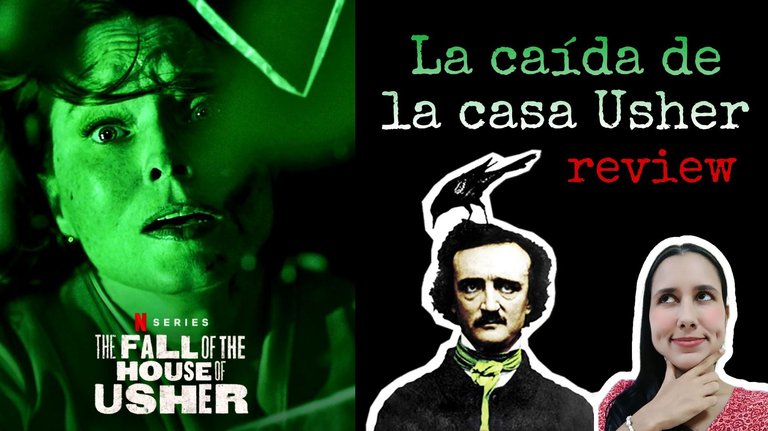


Las icónicas obras de Edgar Allan Poe han sido modernizadas de la mano del director Mike Flannagan, popularmente conocido por sus series "La maldición de Hill House", "La maldición de Bly Manor" "El club de media noche" y "Misa de medianoche". Las expectativas eran altas, pues que un buen director de la actualidad, de vida a las grandes obras literarias de uno de los escritores más populares de todos los tiempos, no sucede todos los días. ¿Ha logrado la caída de la casa Usher hacer justicia a las historias de Poe? Permítanme dar mi punto de vista como fan de este escritor, el cual es uno de mis favoritos, me he leído sus obras reiteradas veces, así que tengo buenos fundamentos.
Cuando me entere de que esta serie iba a realizarse, en un inicio pensé que solo trataría de la historia de Roderick Usher, pero después leí que adaptarían varios de los relatos cortos de Poe y me pregunte cómo lo harían, mis dudas fueron respondidas rápidamente con el tráiler, en esta adaptación Roderick Usher tiene hijos y cada hijo representaría una historia de Poe. Movida inteligente, si me preguntan, pero, ¿funcionaría? Siendo los cuentos de Poe tan queridos, ¿lograrían mezclarlos todos sin alterar su narrativa y esencia?
Les cuento que en un principio no me sentí muy convencida, Poe para mí es vintage, es antique, visualizo en mi mente sus historias con una estética Dark Academia, ambientadas como en una Europa oscura y decadente, así que ver todo mayormente adaptado a la época actual, mientras hablaban de Tik Tok y un montón de superficialidades, no me encajo, pero entendí que posiblemente Mike quiso atraer al público joven o simplemente amoldarse a la nueva era, decidí seguir viendo a ver si empezaba a encajarme todo, no podía evitar preguntarme, ¿Edgar Allan Poe aprobaría esta adaptación? Para mi agrado y alivio, cada pieza fue cayendo en su lugar, Mike Flannagan no me decepciono, aunque sí me asusto y mucho (ya tenia preparado mi cuchillo, ok no).
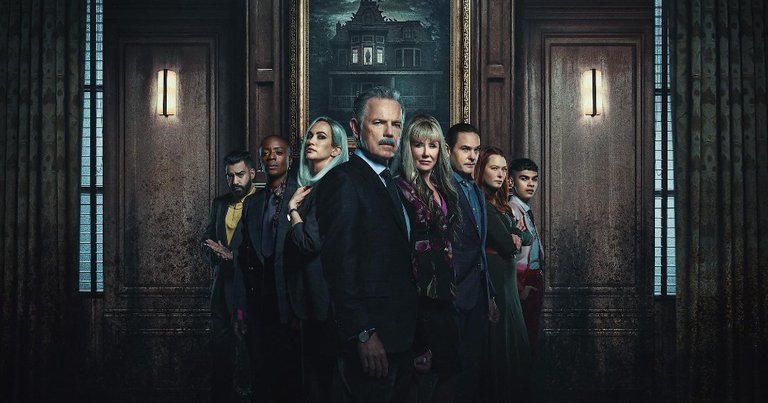
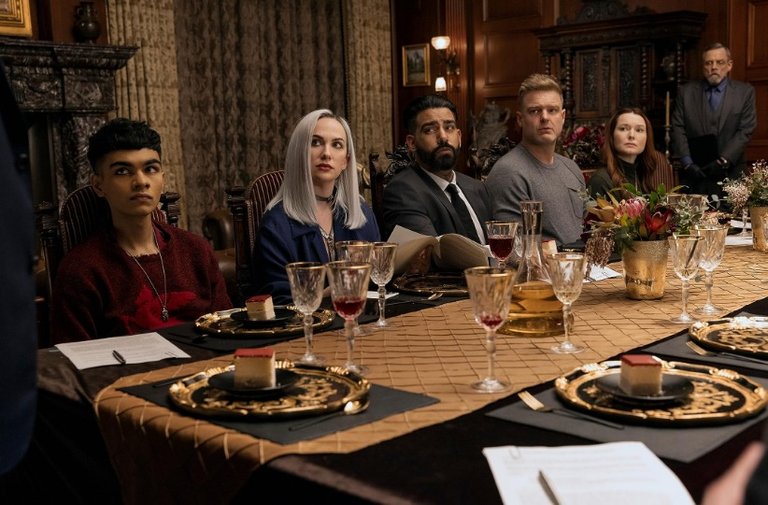
En esta adaptación para Netflix, los hermanos mellizos Madeleine y Roderick Usher logran salir de la pobreza y crean un imperio a raíz de hacerse con la empresa farmacéutica "Fortunato", no obstante, como dijo Honoré de Balzac, "detrás de toda gran fortuna, hay un crimen"... Los hermanos no construyeron su imperio honradamente, así que como todos en esta vida, tienen que rendir cuentas y el momento inevitablemente llego de la mano de una misteriosa entidad que representa no solo al cuervo, sino también (según mi interpretación) a la muerte, consecuencias, el destino y la justicia. Los herederos de la imponente casa Usher empiezan a morir uno por uno, dando lugar a que la verdad detrás de esta inmoral, trágica y decadente familia sea revelada por el mismísimo Roderick Usher en su último día.
Cada capítulo de la serie tiene el nombre de un relato célebre de Poe y estos son los principales en ser representados (La caída de la casa Usher, La máscara de la muerte roja, Los crímenes de la Rue morgue, El gato negro, El corazón delator, El escarabajo de oro, El pozo y el péndulo y El cuervo), pero no solo se limitan a estos, sino que también incluye referencias a muchísimas otras obras de Poe como el "Barril de amontillado", "Berenice" "La narración de Arthur Gordom Pym", "Hop-frog", "Tamerlane", "Annabel Lee", "Conversación con una momia", "Los espíritus de los muertos", "Un sueño en un sueño", "Metzengerstein", "Morella", "El entierro prematuro" y estoy segura de que es posible que haya omitido unos cuantos.
Seré honesta, en un inicio me encontraba un poco indignada porque sentí incluso que la serie era algún tipo de parodia por ciertos toques de humor extraño (ni lo pienso llamar humor negro) que tenía y como mencione más arriba sentí que Mike quiso adaptar tanto las historias de Poe a la actualidad para que encajara con las modas y temas populares de hoy día, que perdió por completo de vista la esencia gótica, sublime y poética de Poe, pero al avanzar poco a poco se fue reivindicando. Lo que me hacía ruido más que nada era que en los primeros capítulos se mostraba lo que para mí es un exceso de promiscuidad y sexualidad totalmente innecesaria, ya que, sí, efectivamente en el relato "La máscara de la muerte roja", Prospero es un príncipe inmoral y promiscuo que realizaba orgías, pero no fallecía de la forma en que lo hizo y tampoco todo se describía tan depravado como se mostró ahí ni mucho menos los personajes que representaban sus hermanos tenían los fetiches sexuales que les colocaron en la serie, en mi mente no entendía la necesidad de hacer todo tan sexual, después recordé que era una serie de Netflix y se me paso jajajaja. En fin, reviví cuando al progresar la serie se dejó eso de lado, todo empezó a tomar forma, entre las muestras de lo que paso en el pasado y lo que estaba pasando en el presente, empezaron los guiños a las diversas obras de Poe y hasta los personajes decían extractos de sus poemas, ya los diálogos no eran vacíos, ahora narraban a Poe (gracias Diosito).
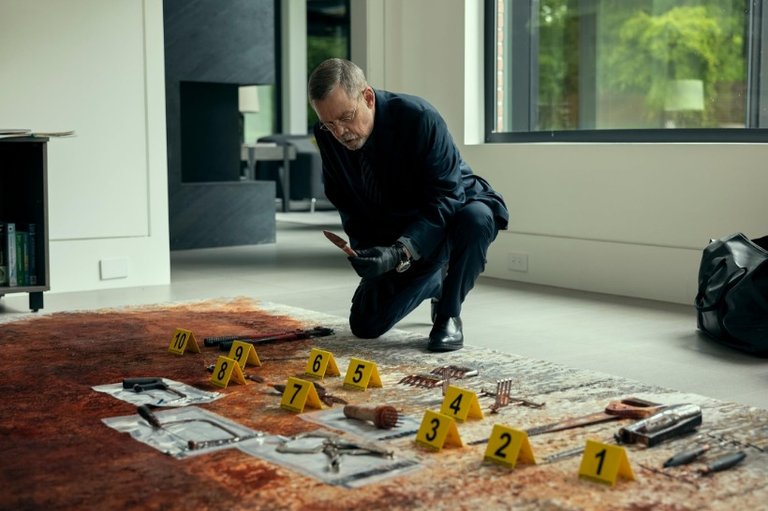
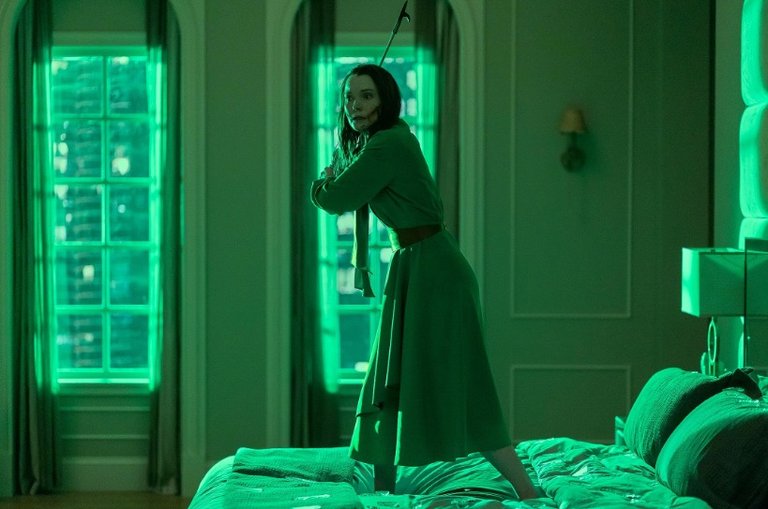
Todas las historias presentadas protagonizadas por los hijos de Roderick Usher quienes tienen los nombres de diferentes personajes de Poe, están inspiradas en las historias, sí, pero no son un reflejo exacto, lo que puede llegar a decepcionar a algunos, digo, el desarrollo de muchas de las historias aunque no fue igual, me pareció inteligente, como en el corazón delator, pero en el caso del gato negro que es uno de los cuentos más queridos de Poe y uno de mis favoritos, sentí que la esencia se perdió un poco, no causa el impacto de la historia original...
El episodio que más me gusto fue el de "Goldbug", el cual pude asimilar fue una mezcla de "Arthur Gordon Pym", "El escarabajo de oro" y "Tamerlane", debido a que me resulto muy interesante la historia de Tamerlane, el cómo contrataba a mujeres para hacer lo que ella debía hacer: vivir su vida plenamente. Tamerlane prefirió ahogarse en el trabajo por su orgullo y deseo de alcanzar el éxito, se conformó con ver a otras simulando ser ella, dejo a su esposo de lado, mientras se ahogaba en el cansancio y la represión de sus sentimientos, muy similar a lo que hizo el conquistador turco/mongol Tarmelane en el relato de Poe al dejar sus sentimientos por su amor de lado por estar obsesionado con el triunfo. El cómo se desarrolló la muerte de esta hija Usher, me pareció fascinante, fue prácticamente una lucha con ella misma, representando algo muy recurrente en las historias de Poe: el autocastigo.
El relato corto que le da nombre a la serie "La caída de la casa Usher" nos cuenta una historia de tragedia, decadencia y locura, de como una familia de linaje y adinerada termina de destruirse con Madeleine y Roderick Usher. En la serie, por ser un popurrí, la historia no se desarrolla tal cual, pero el desenlace es el mismo: La inminente destrucción de la familia Usher. Las únicas sobrevivientes del infierno de la casa Usher (en la adaptación) son la pintoresca Juno, viuda de Roderick y Morella, la pobre viuda de Frederick, las cuales, después de sobrevivir a todas las vivencias perturbadoras, deciden hacer buenas acciones por la humanidad.
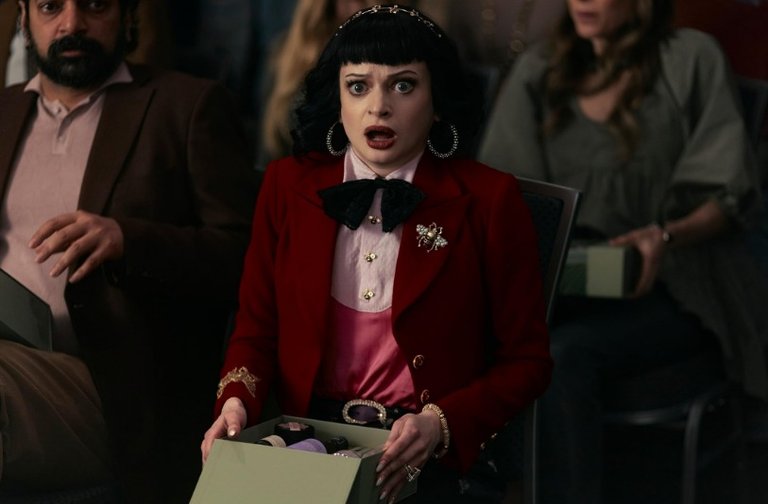
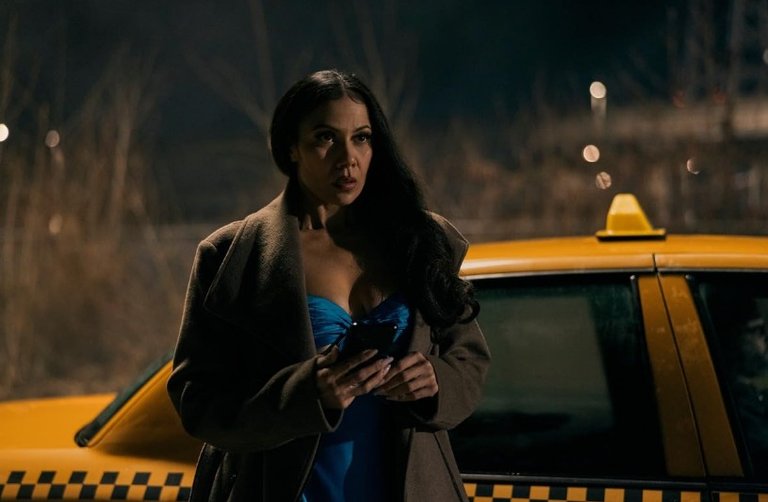
Me pareció un detalle interesante el que en la serie el amigo de Roderick Usher al que este le confiesa todo, sea nada más y nada menos que Auguste Dupin, el detective que Poe creo y protagoniza varía de sus historias (Los crímenes de la Rue morgue, La carta robada y El misterio de Marie Roget), tiene sentido, ya que en el relato original la identidad del amigo de Roderick es indiferente, no tiene ni nombre y que un detective sea quien escuche todo, le da un buen sabor, además, nunca puede faltar un detective en este tipo de series, ¿verdad que no?
El último capítulo de la serie se tituló: "El cuervo", la obra más importante de Poe y es una mezcla de la misma y "la caída de la casa Usher". La verdad es que el capítulo estuvo muy bien ejecutado, el círculo dio la vuelta completa y todo tuvo sentido. ¡Oh!, pobre Roderick Usher atormentado por los fantasmas de su pasado, ¡Oh!, pobre Leonor, la mejor de todas, quien pago por los actos de otras personas, ¡Oh!, "nunca más" dijo Roderick, citando al cuervo... Estoy segura de que Roderick, en otra vida, escogería algo diferente.
Mike Flannagan con "La caída de la casa Usher" no solo quiso rendir homenaje a Poe, sino que también le dio su toque muy personal y aprovecho para hacer varias críticas sociales que son muy evidentes, como la critica a las empresas farmacéuticas y como muchos medicamentos están destruyendo la vida de muchas personas (el fentanilo, por ejemplo) más el uso exagerado de los algoritmos y la inteligencia artificial en general. Las reflexiones no faltan en esta serie, muchas verdades son dichas, en ese sentido puedo decir que Mike lo hizo muy bien, tal vez exagero un poco con las superficialidades, pero los mensajes fueron bastante claros.
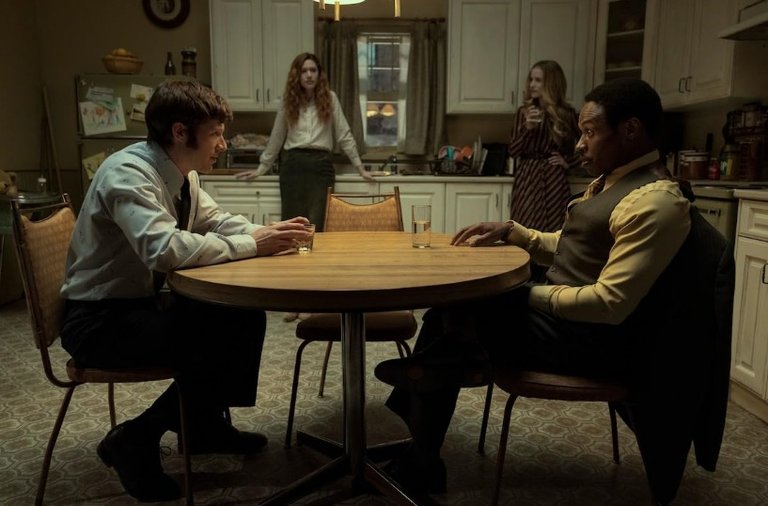
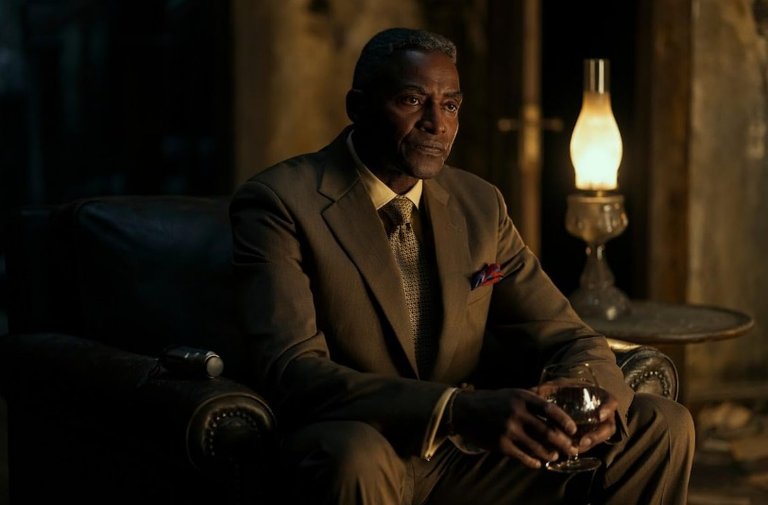
Si hablamos de la estética de la serie, yo imaginaba que iba a ser superretro vintage gótico, pero como se ambientó en la actualidad, todo se veía muy moderno, solo en los flashbacks del pasado se aprecia la belleza de lo antiguo y bueno, no es que esté mal, pero me hubiera gustado ver más belleza oscura, como la esencia de Poe. En cuanto a las actuaciones, que les digo, Mike sabe escoger muy bien a sus actores, lleva trabajando con los mismos en casi todas sus series y agrega a otros poco a poco, no tengo quejas, todos los hicieron muy bien, destaco sobre todo las actuaciones de los actores que interpretaron a Roderick Usher, Auguste Dupin y la entidad (soy tu fan Carla Gugino), posicionándose como mi favorito Carl Lumbly, el actor que interpreta a Auguste, sus expresiones faciales fueron demasiado bien logradas, expreso con su cara exactamente todo lo que tenía que expresar sin tener que decir en esos momentos ni una sola palabra, bravo.
En conclusión, ¿me gusto o no me gusto la serie?, pues... ¡Me gusto y si la volvería a ver! No voy a decir que me encanto todo, porque creo que deje en evidencia que no fue así, pero la serie cumplió y aunque pensé por un momento que Poe se revolcaría en su tumba, creo que le daría una palmadita en la espalda a Mike, no un abrazo, tampoco una palmada, pero sí una palmadita.
Sé que a algunos fans de Poe esta serie puede no llegar a no gustar o no llenar sus expectativas, pero yo, como fan de él, pude entender la visión de Mike y sé que esta serie servirá para que las personas que aún no han leído las obras del gran Edgar Allan Poe, se animen a hacerlo, lo cual ya es una gran ganancia.
Esta serie posiblemente gustara a quienes gusten de Poe y tengan la mente abierta, a quienes disfruten del terror, del misterio, de las metáforas, de lo complicado e incluso hasta el gore (yo no soy fan del gore, pero bueno, sí causa impresión varias de las escenas y creo que era lo que se quería lograr). Si te gusta todo aquello, no dudes en verla, aprovecha que estamos en octubre, mes donde se celebra el Halloween y consúmela, incluso si no te llega a gustar, sé que por lo menos te hará reflexionar... Yo podría decir mucho más como fan empedernida de Poe, pero como siempre, me gusta hacer mis reviews sin dar spoilers, ya saben, incitando a la curiosidad, esa a la que al gato suele matar.
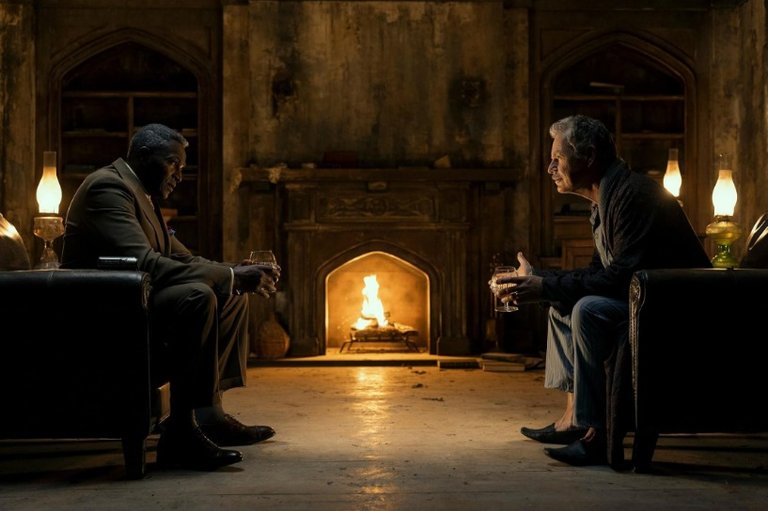
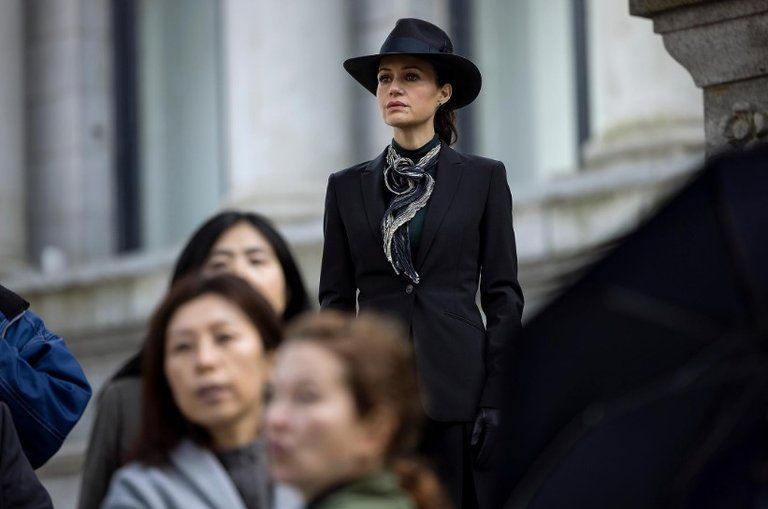


Edgar Allan Poe iconic short stories have been modernized by director Mike Flannagan, popularly known for his "The Haunting of Hill House", "The Haunting of Bly Manor", "Midnight Club" and "Midnight Mass" series. Expectations were high as a good modern day director bringing to life the great literary works of one of the most popular writers of all time doesn't happen every day. Has "The Fall of the House of Usher" managed to do justice to Poe's stories? Let me give my point of view as a fan of this writer, who is one of my favorites, I have read his works repeatedly, so I have a good foundation.
When I found out that this series was going to be made, at first I thought it would only be about Roderick Usher's story, but then I read that they would adapt several of Poe's short stories and I wondered how they would do it, my doubts were quickly answered with the trailer, in this adaptation Roderick Usher has children and each child would represent a Poe's story. Smart move if you ask me, but would it work? With Poe's stories being so beloved, would they manage to blend them all together without altering their narrative and essence?
I tell you that at first I was not very convinced, Poe for me is vintage, is antique, I visualize in my mind his stories with a Dark Academia aesthetic, set in a dark and decadent Europe, so seeing everything mostly adapted to the current era, while they were talking about Tik Tok and a lot of superficialities, didn't really click for me, but I understood that possibly Mike wanted to appeal to the young audience or just mold to the new era, I decided to keep watching to see if everything would start to fit for me, I couldn't help but wonder, would Edgar Allan Poe approve of this adaptation? To my delight and relief, each piece fell into place, Mike Flannagan didn't disappoint, although he did scare me a lot (I already had my knife ready) .
In this Netflix adaptation, twin brothers Madeleine and Roderick Usher manage to rise from poverty and create an empire by taking over the pharmaceutical company "Fortunato", however, as Honoré de Balzac once said, "behind every great fortune, there is a crime".... The brothers did not build their empire honestly, so like everyone in this life, they have to be held accountable and the moment inevitably came at the hand of a mysterious entity which represents not only the raven, but also (according to my interpretation) death, consequences, destiny and justice. The heirs of the impressive House of Usher begin to die one by one, leading to the truth behind this immoral, tragic and decadent family being revealed by Roderick Usher himself on his last day.
Each chapter of the series is named after a famous Poe story and these are the main ones to be represented (The Fall of the House of Usher, The Masque of the Red Death, The Crimes of Rue Morgue, The Black Cat, The Tell-Tale Heart, The Gold-bug, The Pit and the Pendulum and The Raven), but not only limited to these, but also includes references to numerous other works by Poe such as "The Cask of Amontillado", "Berenice", "The Narrative of Arthur Gordom Pym of Nantucket", "Hop-frog", "Tamerlane", "Some Words with a Mummy", "Annabel Lee", "A Dream within a Dream", "Metzengerstein", "Morella", “Spirits of the Dead”, “The Premature Burial” and I'm sure it's possible that I've omitted a few.
I'll be honest, at the beginning I was a little outraged because I even felt that the series was some kind of parody due to certain touches of strange humor (I won't even call it black humor) that it had and as I mentioned above I felt that Mike wanted to adapt Poe's stories so much to the present day to fit in with today's fashions and popular themes, that he completely lost sight of Poe's gothic, sublime and poetic essence, but as it progressed little by little it was vindicated. What made me noise more than anything was that in the first chapters showed what for me is an excess of promiscuity and sexuality totally unnecessary, because, yes, indeed in the story "The Mask of the Red Death", Prospero is an immoral and promiscuous prince who performed orgies, but he didn't die the way he did and neither everything was described as depraved as it was shown there nor much less the characters that represented his siblings had the sexual fetishes that were placed on them in the series, in my mind I didn't understand the need to make everything so sexual, then I remembered that it was a Netflix series and I got over it hahahaha. Anyway, I came back to life when the series progressed, everything began to take form, between the displays of what happened in the past and what was happening in the present, the winks to the various works of Poe began and even the characters said fragments of his poems, the dialogues were no longer empty, now they were narrating Poe (thank god).
All the stories presented starring the sons of Roderick Usher who have the names of different characters of Poe, are inspired by the original tales, yes, but they are not an exact reflection, which may disappoint some, I mean, the development of many of the stories although it was not the same, I found it intelligent, as in "The tell-tale heart", but in the case of "The black cat" which is one of the most loved stories of Poe and one of my favorites, I felt that the essence was lost a little, it does not cause the impact of the original story...
The episode I liked the most was "Goldbug", which I could identify as a mixture of "Arthur Gordon Pym", "The Gold-bug" and "Tamerlane", because I found very interesting the story of Tamerlane, how she hired women to do what she should do: live her life to the fullest. Tamerlane preferred to drown herself in work because of her pride and desire to achieve success, she settled for seeing others pretending to be her, she left her husband aside, while she drowned in exhaustion and repression of her feelings, very similar to what the Turkish/Mongolian conqueror Tarmelane did in Poe's story when he left his feelings for his love aside because he was obsessed with success. How this Usher daughter's death unfolded, I thought was fascinating, it was practically a battle with herself, representing something very recurrent in Poe's stories: self-punishment.
The short story that gives its name to the series "The Fall of the House of Usher" tells us a story of tragedy, decadence and madness, of how a family of lineage and wealth ends up destroying itself with Madeleine and Roderick Usher. In the series, because it is a "medley", the story does not unfold as is, but the outcome is the same: the imminent destruction of the Usher family. The only survivors of the hell of the Usher house are the picturesque Juno, Roderick's widow, and Morella, Frederick's poor widow, who after surviving all the disturbing experiences, decide to do good deeds for humanity.
I thought it was an interesting detail that in the series Roderick Usher's friend to whom he confesses everything is none other than Auguste Dupin, the detective that Poe created and stars in several of his stories (The Crimes of the Rue Morgue, The Purloined Letter and The Mystery of Marie Roget), it makes sense, since in the original story the identity of Roderick's friend is irrelevant, he has no name and the fact that a detective is the one who listens to everything, gives it a good flavor, besides, you can never miss a detective in this kind of series, right?
The last chapter of the series was titled: "The Raven", Poe's most important work and is a mixture of the same and "The Fall of the House of Usher". The truth is that the chapter was very well executed, the story went full circle and everything made sense. Oh!, poor Roderick Usher tormented by the ghosts of his past, Oh!, poor Leonor, the best of all, who paid for the acts of others, Oh!, "never again" said Roderick, citing the raven.... I'm sure Roderick, in another life, would choose something different.
Mike Flannagan with "The Fall of the House of Usher" not only wanted to pay tribute to Poe, but also gave it his very personal touch and took the opportunity to make several social criticisms that are very evident, such as criticism of pharmaceutical companies and how several drugs are destroying the lives of many people (fentanyl, for example) plus the exaggerated use of algorithms and artificial intelligence in general. Reflections are not missing in this series, many truths are told, in that sense I can say that Mike did very well, maybe he exaggerated a little with the superficialities, but the messages were pretty clear.
If we talk about the aesthetics of the series, I imagined it was going to be super retro vintage gothic, but as it was set in the present, everything looked very modern, only in the flashbacks of the past the beauty of the old is appreciated and well, not that this is bad, but I would have liked to see more darkness, as the essence of Poe. As for the acting, what can I say, Mike knows how to choose his actors very well, he has been working with the same actors in almost all his series and adds others little by little, I have no complaints, they all did very well, I highlight more than all the performances of the actors who played Roderick Usher, Auguste Dupin and the entity (I'm your fan Carla Gugino), positioning as my favorite Carl Lumbly, the actor who plays Auguste, his facial expressions were too well achieved, he expressed with his face exactly everything he had to express without having to say at those moments not a single word, bravo.
In conclusion, did I like or dislike the series?,well... I liked it and I would watch it again! I'm not going to say that I loved everything, because I think I made it clear that I didn't, but the series delivered and although I thought for a moment that Poe would roll over in his grave, I think he would give Mike a little pat on the back, not a hug, not a big pat either, but a little pat.
I know that some Poe fans may not like this series or may not meet their expectations, but I as a fan of him, I could understand Mike's vision and I know that this series will serve to encourage people who have not yet read the works of the great Edgar Allan Poe to do so, which is already a great achievement.
This series will probably appeal to those who like Poe and have an open mind, to those who enjoy horror, mystery, metaphors, complicated and even gore (I'm not a fan of gore, but well, it does make an impression in some of the scenes and I think that's what they wanted to achieve). If you like all that, don't hesitate to watch it, take advantage that we are in October, the month where Halloween is celebrated and consume it, even if you don't like it, I know that at least it will make you reflect... I could say much more as an avid fan of Poe, but as always, I like to make my reviews without giving spoilers, you know, inciting curiosity, the one that usually kills the cat.
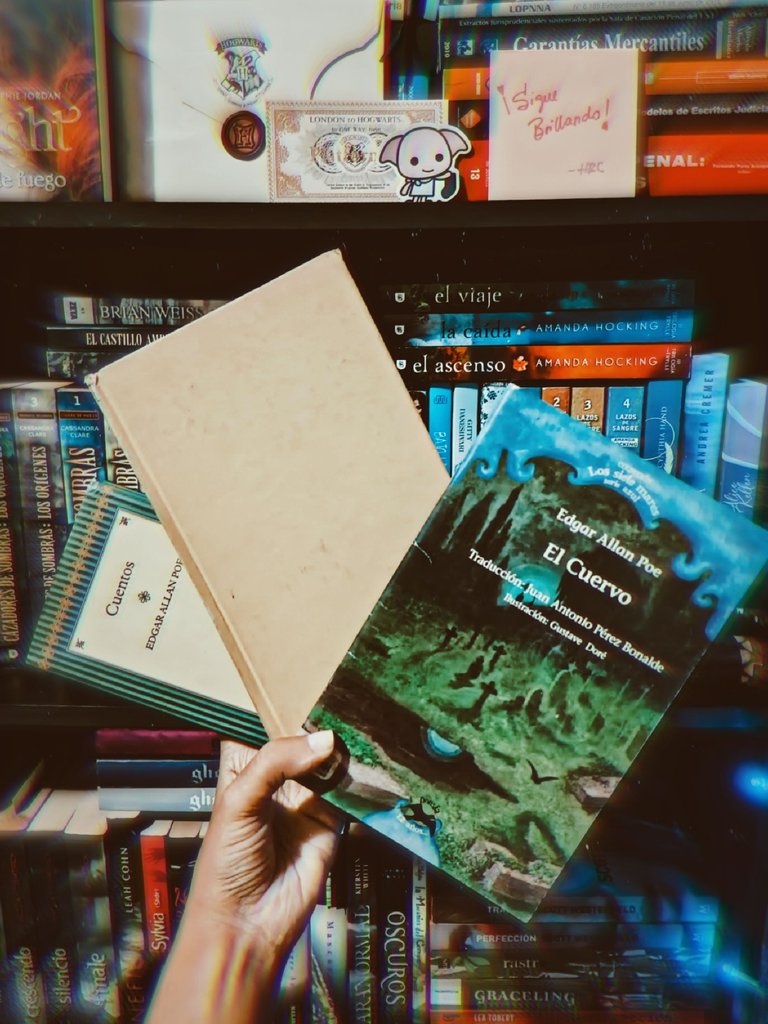
My Poe's books 🤓



| El gato negro | |
|---|---|
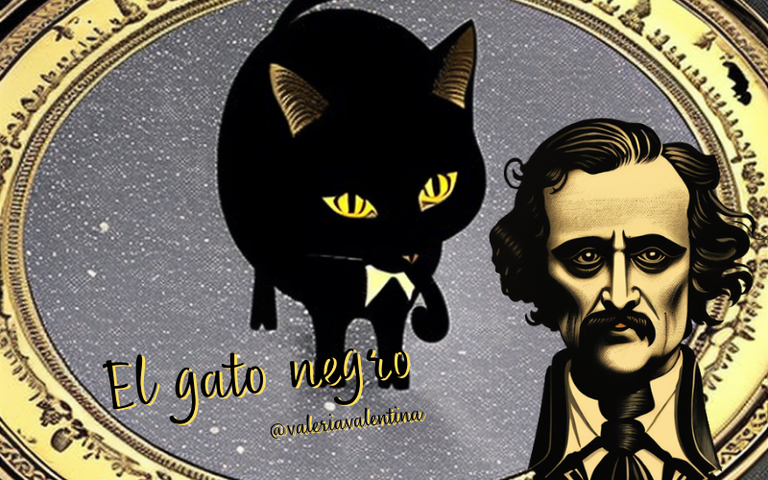 | https://peakd.com/hive-180164/@valeriavalentina/hablemos-de-el-gato-negro |
| El corazón delator | |
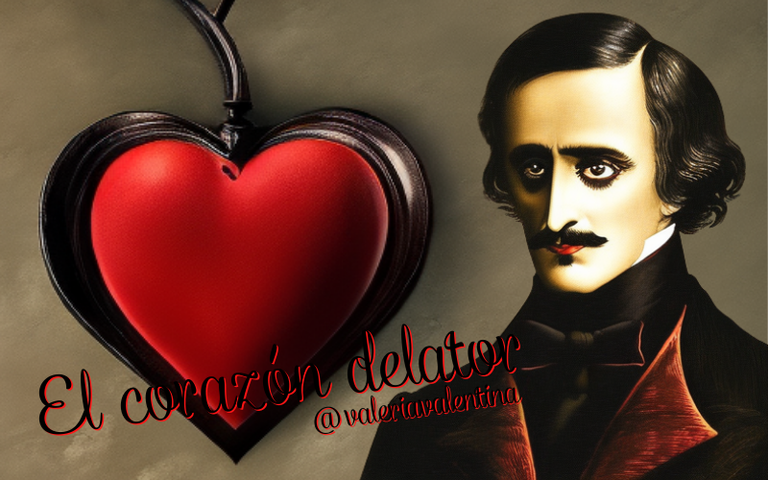 | https://peakd.com/hive-180164/@valeriavalentina/el-corazon-delator-cuento-de |
| La caída de la casa Usher | |
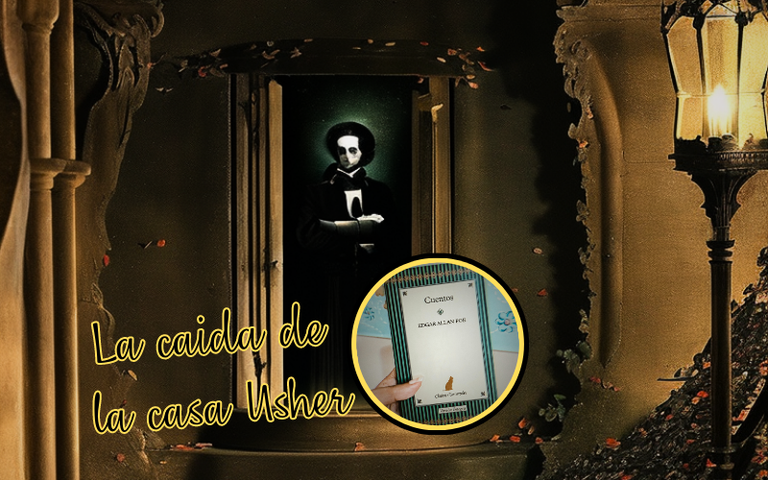 | https://peakd.com/hive-180164/@valeriavalentina/la-caida-de-la-casa |
┌───── •ˋˏ ༻✿༺ ˎˊ• ─────┐
Cabecera, banners y separador
creados + editados por mí en Canva.
Avatar personalizado creado por mí en Bitmoji.
Las imágenes que no son de mi autoría tienen
sus respectivas fuentes (lastima que Netflix
no deja hacer capturas de pantalla).
└────── •✿• ──────┘



